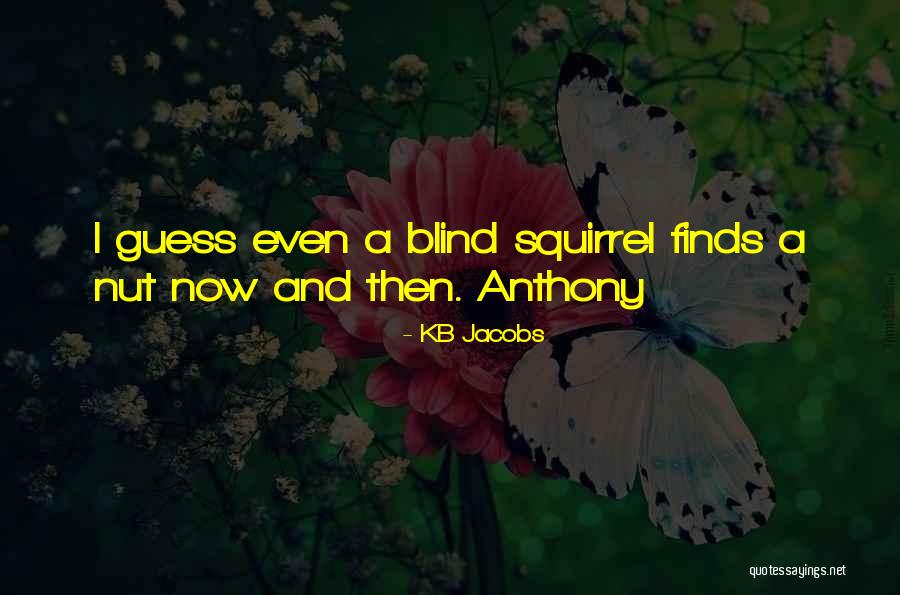Blind Squirrel Finds A Nut: Understanding The Idiom And Its Deeper Meanings
Mar 22 2025
The idiom "blind squirrel finds a nut" is a fascinating expression that carries significant meaning in both everyday language and philosophical contexts. It highlights the idea that even those with limited abilities or resources can still achieve success through sheer luck or persistence. This phrase has deep roots in cultural references and is often used to describe unexpected outcomes or situations where success seems improbable. In this article, we will explore the origins, implications, and applications of this idiom in various aspects of life.
At first glance, the phrase might seem simple, but its implications extend far beyond mere chance. It speaks to the resilience and adaptability of individuals who face challenges yet manage to overcome them. Whether in business, personal development, or even scientific studies, the concept of the blind squirrel finding a nut can inspire and motivate people to pursue their goals despite obstacles.
As we delve deeper into this topic, we will explore the origins of the idiom, its relevance in modern times, and how it applies to real-life scenarios. By the end of this article, you will gain a comprehensive understanding of why this phrase continues to resonate with people worldwide and how it can be applied to improve your outlook on life.
Read also:My Chungus Life A Comprehensive Guide To Understanding And Thriving
Origins of the Phrase "Blind Squirrel Finds a Nut"
The idiom "blind squirrel finds a nut" has been part of colloquial language for generations. Its origins can be traced back to early American folklore, where it was used to describe situations where someone achieved success purely by chance. The phrase is rooted in the imagery of a squirrel, an animal known for its industriousness, finding food despite being blind. This metaphor serves as a reminder that success is not always tied to skill or intelligence but can also result from serendipitous circumstances.
Historical references to the phrase can be found in literature and oral traditions, where it was often used to highlight the unpredictability of life. Over time, the idiom has evolved to encompass broader meanings, including the idea that persistence and determination can lead to unexpected opportunities. This evolution reflects the changing perspectives on success and achievement in society.
Symbolism Behind the Blind Squirrel
The blind squirrel in the idiom symbolizes individuals who may lack certain advantages or abilities but still manage to succeed. This imagery emphasizes the importance of perseverance and adaptability in overcoming challenges. The nut, on the other hand, represents success or achievement, which can come in various forms depending on the context.
Symbolically, the phrase challenges the notion that success is solely dependent on talent or resources. Instead, it suggests that luck, timing, and effort can play crucial roles in achieving one's goals. This perspective encourages people to remain optimistic and open to opportunities, even when faced with seemingly insurmountable odds.
Blind Squirrel Finds a Nut: Modern Applications
Business and Entrepreneurship
In the world of business, the idiom "blind squirrel finds a nut" can be applied to describe situations where entrepreneurs achieve success through unconventional means. Many successful startups began as small ventures with limited resources, yet they managed to grow and thrive due to a combination of hard work and fortunate circumstances. This aligns with the idea that success is not always predictable and can arise from unexpected opportunities.
- Small businesses often rely on innovative strategies to compete with larger corporations.
- Entrepreneurs who embrace risks and remain adaptable are more likely to succeed.
- Success in business is often a combination of skill, perseverance, and luck.
Personal Development
On a personal level, the phrase can serve as a source of motivation for individuals striving to improve themselves. It reminds us that success is not always tied to inherent abilities but can also result from persistence and a willingness to take chances. By adopting this mindset, people can approach challenges with greater confidence and resilience.
Read also:Comprehensive Guide To Accessing Iot Devices Via Ssh A Stepbystep Tutorial
- Embracing failures as learning opportunities can lead to personal growth.
- Setting realistic goals and remaining persistent can yield unexpected results.
- Staying open to new experiences can increase the likelihood of achieving success.
Blind Squirrel Finds a Nut: Scientific Perspective
From a scientific standpoint, the concept of the blind squirrel finding a nut can be linked to probability theory and statistical analysis. In nature, animals like squirrels rely on instincts and environmental cues to locate food. While a blind squirrel may face additional challenges, it can still succeed if the conditions are favorable. This parallels the idea that even in situations where the odds are against us, success can still occur if the right factors align.
Probability and Luck
Probability theory suggests that even unlikely events can occur given enough time and opportunities. This principle can be applied to various aspects of life, including career advancement, relationship building, and financial success. By increasing the number of attempts or opportunities, individuals can improve their chances of achieving their goals, even if the odds seem slim.
- Increasing exposure to opportunities can enhance the likelihood of success.
- Understanding probability can help individuals make informed decisions.
- Recognizing the role of luck in success can foster humility and gratitude.
Cultural Significance of the Idiom
The phrase "blind squirrel finds a nut" has become a cultural staple, often used in movies, literature, and everyday conversations. Its widespread use reflects its universal appeal and relevance to human experiences. Across different cultures, similar expressions exist, emphasizing the importance of perseverance and adaptability in achieving success.
Global Variations of the Idiom
While the specific wording of the phrase may vary across cultures, the underlying message remains consistent. In many societies, there are idioms or proverbs that convey the idea that success can come from unexpected sources. These expressions serve as reminders that life is unpredictable and that opportunities can arise in unforeseen ways.
- Chinese proverbs emphasize the importance of perseverance and adaptability.
- Indian folklore often highlights the role of fate and timing in success.
- Western cultures frequently celebrate the underdog who achieves success against the odds.
Blind Squirrel Finds a Nut: Psychological Insights
Psychologically, the idiom offers valuable insights into human behavior and motivation. It highlights the importance of maintaining a positive mindset and remaining open to possibilities, even when faced with adversity. By adopting this perspective, individuals can cultivate resilience and optimism, which are essential traits for achieving long-term success.
Growth Mindset and Resilience
Research in psychology suggests that individuals with a growth mindset are more likely to succeed, as they view challenges as opportunities for learning and growth. Similarly, resilience plays a crucial role in overcoming obstacles and achieving one's goals. The idiom "blind squirrel finds a nut" encapsulates these principles, encouraging people to remain persistent and adaptable in the face of adversity.
- Embracing a growth mindset can lead to greater success and fulfillment.
- Developing resilience can help individuals overcome setbacks and challenges.
- Staying optimistic can increase the likelihood of seizing opportunities.
Blind Squirrel Finds a Nut: Real-Life Examples
Throughout history, there have been numerous examples of individuals and organizations that embody the spirit of the idiom "blind squirrel finds a nut." These stories serve as inspiration for those facing challenges and demonstrate the power of perseverance and adaptability in achieving success.
Success Stories
One notable example is the story of Thomas Edison, who famously failed thousands of times before inventing the light bulb. His persistence and willingness to learn from failures exemplify the principles embodied by the idiom. Similarly, companies like Airbnb and Uber started as small ventures with limited resources but grew into global giants through innovation and determination.
- Thomas Edison's perseverance led to groundbreaking inventions.
- Airbnb and Uber transformed industries through innovative approaches.
- Individuals overcoming adversity can inspire others to pursue their dreams.
Blind Squirrel Finds a Nut: Educational Implications
In the field of education, the idiom can be applied to encourage students to remain persistent and open-minded in their learning journeys. By fostering a growth mindset and emphasizing the importance of effort over innate ability, educators can help students achieve success in various academic and personal endeavors.
Encouraging Persistence in Education
Research shows that students who believe in their ability to improve through effort and practice tend to perform better academically. By incorporating the principles of the idiom into educational practices, teachers can inspire students to embrace challenges and view failures as opportunities for growth.
- Promoting a growth mindset can enhance student performance.
- Encouraging persistence can lead to greater academic success.
- Helping students recognize the role of effort in achievement can foster resilience.
Blind Squirrel Finds a Nut: Environmental Perspective
From an environmental standpoint, the idiom can be linked to the concept of sustainability and resourcefulness. Just as a blind squirrel manages to find a nut, humans can learn to adapt to changing environmental conditions and make the most of available resources. This perspective highlights the importance of conservation and responsible resource management.
Sustainability and Adaptability
In an era of climate change and resource scarcity, the principles embodied by the idiom become increasingly relevant. By embracing adaptability and resourcefulness, individuals and communities can work towards a more sustainable future. This aligns with global efforts to address environmental challenges and promote ecological balance.
- Adopting sustainable practices can help conserve natural resources.
- Encouraging adaptability can lead to innovative solutions for environmental issues.
- Promoting resourcefulness can foster resilience in the face of climate change.
Blind Squirrel Finds a Nut: Final Thoughts
In conclusion, the idiom "blind squirrel finds a nut" offers valuable insights into the nature of success and achievement. It highlights the importance of perseverance, adaptability, and resilience in overcoming challenges and seizing opportunities. Whether in business, education, or personal development, the principles embodied by this phrase can inspire individuals to pursue their goals with determination and optimism.
We encourage readers to reflect on the lessons learned from this article and apply them to their own lives. By embracing the spirit of the blind squirrel, you can increase your chances of achieving success, even in the face of adversity. Share your thoughts and experiences in the comments below, and don't forget to explore other articles on our site for more inspiring content.
Table of Contents
- Origins of the Phrase "Blind Squirrel Finds a Nut"
- Symbolism Behind the Blind Squirrel
- Blind Squirrel Finds a Nut: Modern Applications
- Business and Entrepreneurship
- Personal Development
- Blind Squirrel Finds a Nut: Scientific Perspective
- Probability and Luck
- Cultural Significance of the Idiom
- Global Variations of the Idiom
- Blind Squirrel Finds a Nut: Psychological Insights
- Growth Mindset and Resilience
- Blind Squirrel Finds a Nut: Real-Life Examples
- Success Stories
- Blind Squirrel Finds a Nut: Educational Implications
- Encouraging Persistence in Education
- Blind Squirrel Finds a Nut: Environmental Perspective
- Sustainability and Adaptability
- Blind Squirrel Finds a Nut: Final Thoughts


